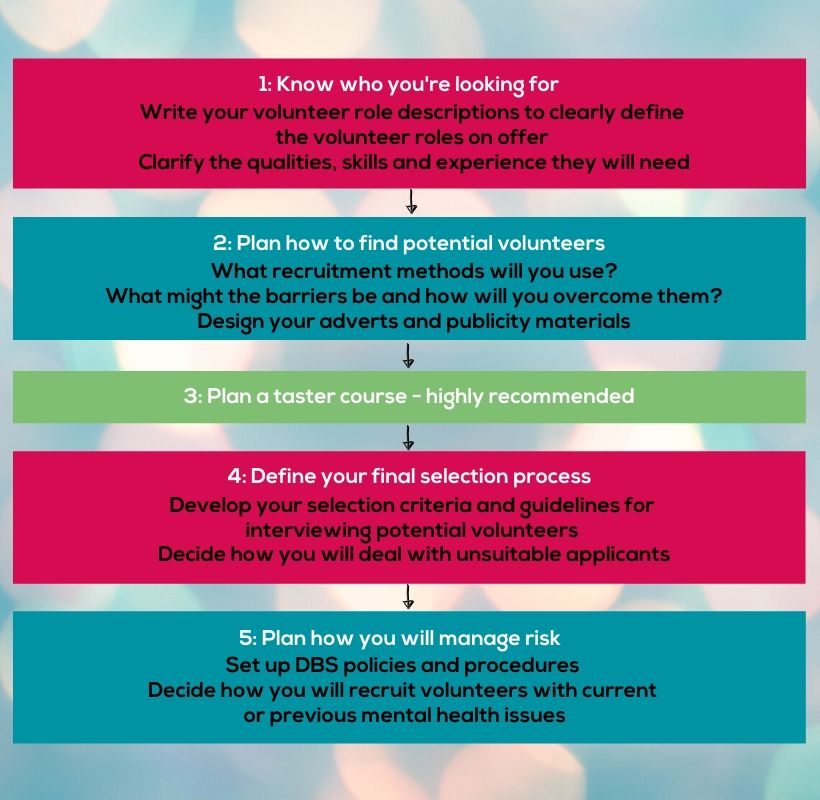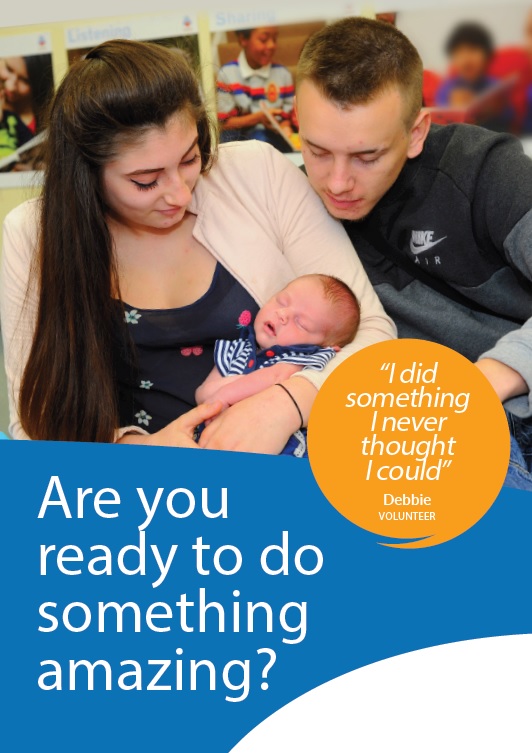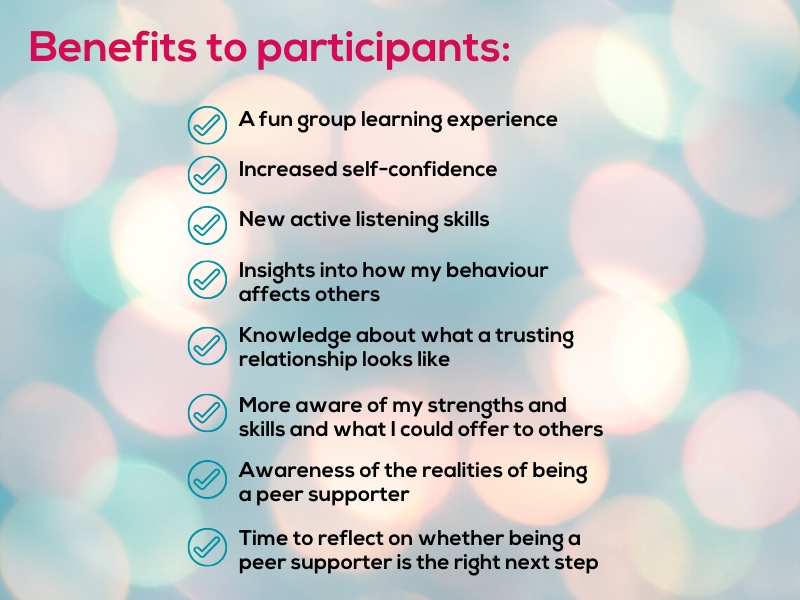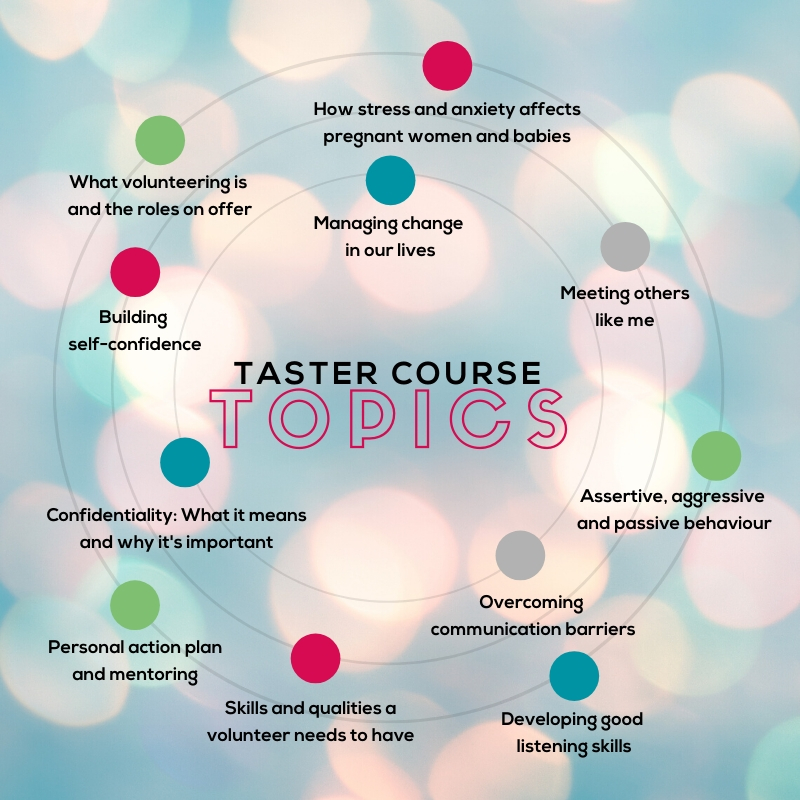Recruiting volunteers with the right personal qualities, experience and skills is key to the success of your programme. The relationships they build are core to the support you can offer. This section helps you to plan the main steps to get the right people, in the right roles.
Why Volunteer?
It’s worth keeping in mind what the benefits of volunteering are as well as what might stop people from volunteering. Benefits range from their own satisfaction gained from supporting others, to increased social networks, gaining new skills and knowledge and finding out more about a work sector they are interested in. The most consistently reported benefit to volunteers overall is an increase in self-confidence – a positive additional identity outside parenthood and to feel like ‘I am making a difference’.
Listen to what a Community Parent volunteer has to say:
Key steps to your recruitment strategy

Our recruitment guide has more detail, see section 2, page 7 onwards.
Before you start recruiting volunteers, you’ll need to have a clear picture of who you’re looking for; this is vital from the beginning.
Start by writing a clear role description for each volunteer role.
This will give both the organisation and volunteer a shared understanding of the expectations of the role and the skills and qualities needed to carry it out.
It’s really important that you create a role description and not an employment contract. A role description is for an unpaid role and only describes expectations of a role.
Find out more:
- Guidance and best practice on writing role descriptions
- How to avoid creating an employment contract
- Volunteer peer supporter role and Volunteer Birth Buddy role descriptions (downloadable examples below).
Volunteer peer supporter role description part 1
Added 16/06/2025Volunteer peer supporter role description part 2
Added 16/06/2025Volunteer Birth Buddy role description
Added 16/06/2025Great parent support volunteers come in all forms, but share some key qualities:

- Ability to establish relationships, build trust and equality
- Desire to ‘give something back’ to their community
- Caring, sensitive and approachable
- Absolute commitment to safeguarding children
- Reliable and consistent, able to give their time
- Lived experience of common issues affecting parents
While other characteristics can be developed through training and development:

- Active listening skills
- Confidence
- Ability to have difficult conversations
- Skills for enabling, supporting and empowering parents
- Being clear about purpose and boundaries
- Working with professionals
Our recruitment guide will help you define what you’re looking for in a volunteer.
Recruiting Community Parents
Now you need to find potential volunteers and get them interested.
You can do this through:

- Word of mouth (especially after the first group is up and running) particularly in local and existing groups where parents already get together
- Facebook and social media tagging relevant local links
- Leaflets – schools, early years and health services, targeted door-to-door (please download example leaflet below).
- Register on the Do-it website and your local Community & Voluntary Service (CVS) and volunteer agencies
- Promotional events, talks and presentations and informal coffee mornings
Want to adapt this leaflet to suit your local programme? Need further assistance with this? Please email [email protected] for more information.
Example of Volunteer Recruitment Leaflet
Added 15/07/2025Potential volunteers might not feel confident enough or realise their potential.
A taster course is a great way to cut through some of those barriers and give potential volunteers a way of testing the water in a friendly, informal setting.

Why a taster course is a great first step to recruiting volunteers:
- Straight advertising alone is not enough
- Helps avoid recruiting unsuitable volunteers - reducing drop-outs later
- Builds confidence and new skills. Participants discover their potential and what they could offer (many are not aware of this at first)
- The course facilitator gains insights into participants’ experience and personal qualities. Those not suitable to become a volunteer can be gently mentored into alternative opportunities.

Course participants consider:
- What the volunteer roles on offer involve
- Whether it’s the right choice for them
- Whether they are ready to make a commitment.
Quick overview

See our Delivering your programme guide for more information, tools and resources about advertising and delivering a taster course.
Interviews are a chance for you to get a clearer picture of an applicant’s strengths and challenges, as well as a sense of their emotional resilience. To get the best out of applicants, interviews should be informal and supportive – encouraging them to talk openly and exploring what they can do, rather than what they can’t.
When an applicant isn’t suitable for the role
With skilled interviewing, applicants will often realise that the role isn’t right for them. For example, they may clearly demonstrate the need to ‘fix’ problems rather than to empower parents or be unable to identify safeguarding issues.
Consider whether there are other roles that are more suited to them, or where possible, signpost to other opportunities in the community.
Our recruitment guide outlines best practice for interviews, including useful scenarios that will open up discussion around emotional resilience in a peer supporter role.
Download example volunteer peer supporter interview questions and scoring sheet (below).
Volunteer peer support interview questions
Added 05/01/2026Volunteer peer supporter interview scoring sheet
Added 05/01/2026DBS
- It’s mandatory for every volunteer working with children and promoting health and wellbeing with vulnerable adults, to have an enhanced DBS check
- Make sure this is clear on any adverts, so applicants know up front
- Those barred by the DBS must not carry out a parent support role
- There may be occasions that aren’t clear cut (for example, when the DBS check shows information that has not led to a criminal conviction but may show a potential danger to a vulnerable adult or child)
- It’s crucial to have up-to-date policies and procedures in place
Seek further advice from your approved DBS provider and read more in the Manual Guide: Recruiting and selecting volunteers (downloadable below).
The value of lived experience
Every volunteer needs the emotional resilience and personal qualities to be able to support another parent effectively.
There can be great reciprocal benefits, for example, for a parent affected by depression to be supported by someone who has gone through it themselves – so long as it’s not detrimental for the volunteer, and they don’t over-identify and try to ‘fix things’.
Similarly, some people who have, or have had, mental health issues can be great volunteers. But you need a clear risk assessment process in place when recruiting, to see if the role is suitable for the applicant. This process should involve a suitably qualified health professional.
Regular volunteer supervision processes will need to be in place to continue the risk assessment process when volunteers start supporting parents.
Read more in the Manual Guide: Recruiting and selecting volunteers.
Manual Guide: Recruiting and selecting volunteers
Added 13/05/2025Please sign in to download this file.

